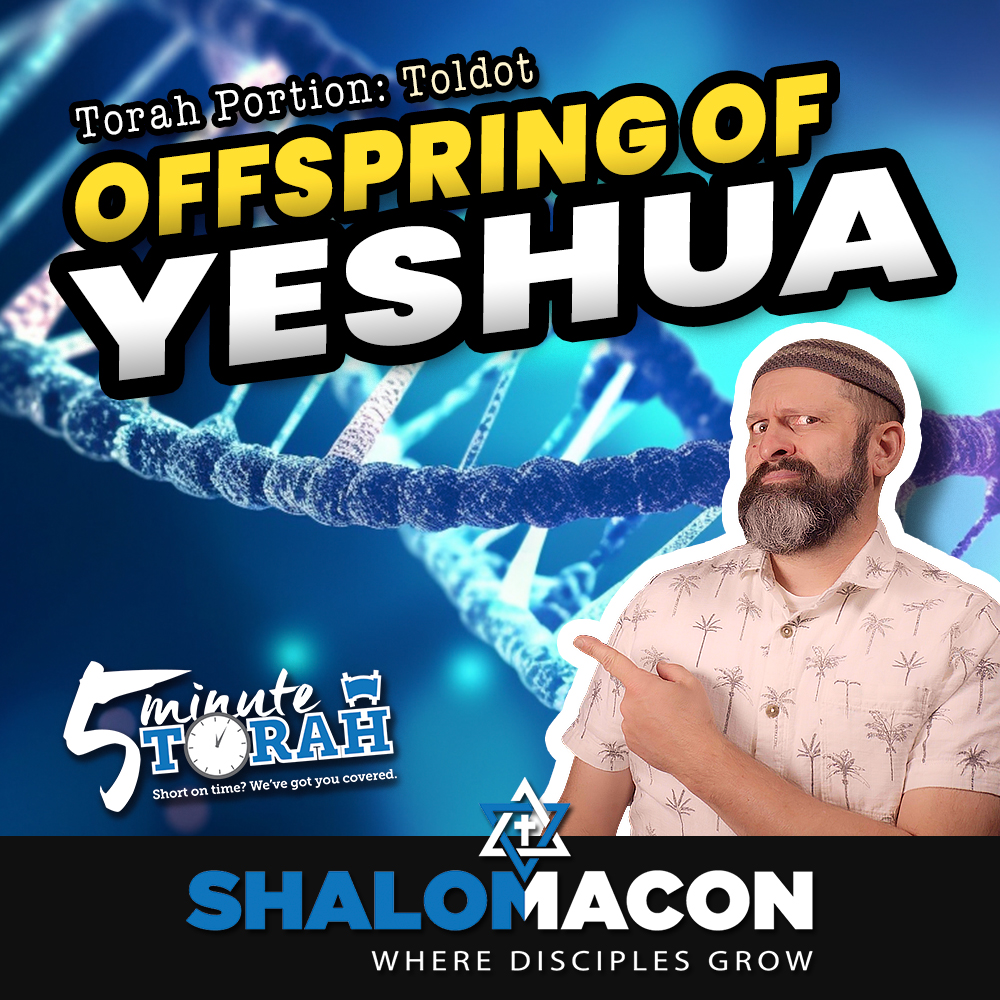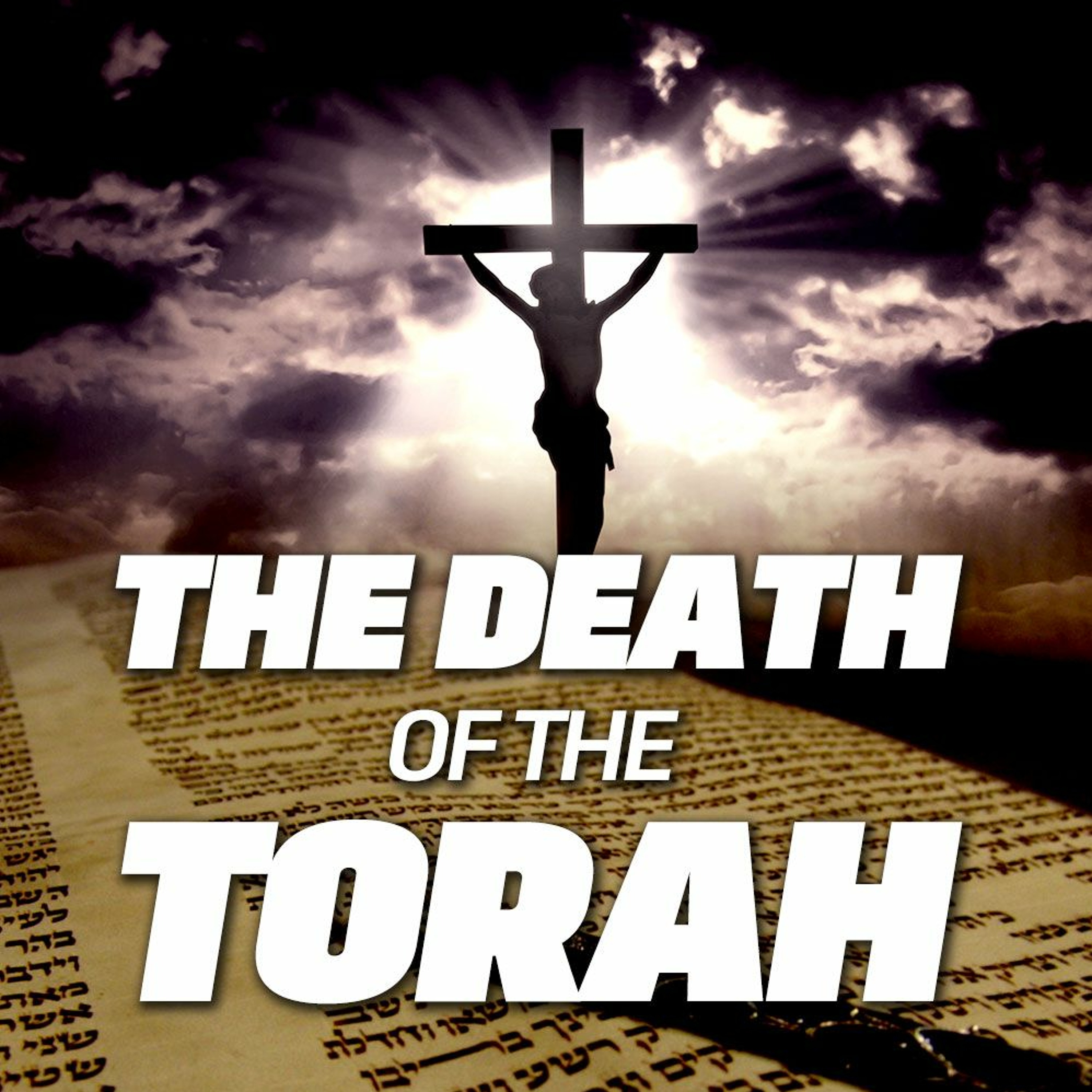Episode Transcript
[00:00:00] For centuries, people like Dan Brown have obsessed over the idea that Yeshua had secret descendants, a hidden bloodline passed through the ages. And if we look closely, the Torah may contain a hint to this genetic marker of Yeshua's true offspring hidden in this week's Torah portion. Join me to discover what that is in this week's five Minute Torah.
[00:00:28] Shalom and blessings from Shalom Macon, the place where disciples of Egypt Yeshua learn, connect and grow. I'm Darren, and before I get into the five minutes of my five Minute Torah commentary, let's cover a few quick facts about this week's Torah portion. This week we are studying the sixth portion of the new Torah cycle. We are in the portion of toldot Genesis 25:19 28:9 and here are the three things that you need to know about it. Number one wrestling in the Womb Jacob and Esau the Torah portion of Toldot gives us the backstory of the conflict between Isaac's twin sons, Jacob and Esau. Even in the womb, there was tension between them. When Rebekah sensed the turmoil within her, she asked the Lord what was happening. He replied, two nations are in your womb and two peoples will be separated from within you. One will be stronger than the other, and the older will serve the younger. After describing their unusual birth, with Esau emerging first and Jacob grasping his heel, the Torah quickly moves to the scene where Esau spurns his birthright. See selling it to Jacob for a pot of lentil soup, setting the stage for the drama that unfolds at the end of our portion. Number two Like Father, like son Isaac and Abimelech Another famine struck in Canaan, just as it had in Abraham's day, and Isaac responded almost exactly as his father had. He headed toward Egypt, but stopped in the Philistine city of Gerar. There he repeated Abraham's tactic, telling the people that Rebekah was his sister when he One day, Abimelech, the king of the Philistines, looked out of his window and saw Isaac playfully interacting with Rebekah. Realizing she was his wife and not his sister, he rebuked Isaac and issued a decree to protect Rebekah from any man who might harm her. Once again, God safeguarded his children despite their questionable decisions. And number three, the first heist, Isaac blesses Jacob. Although God had promised Rebekah that Jacob, not Esau, would be the chosen son, it seemed the rest of the family never really fully understood this. Isaac appears to have intended Esau to take the lead by his old age. Isaac's eyesight had grown so dim that he could no longer distinguish his sons by sight. Rebekah seized this opportunity, instructing Jacob to impersonate Esau while his brother was away so so he could receive the blessing Isaac intended for the firstborn. The fallout was severe. For years afterward, Jacob lived in fear of Esau's revenge. Welcome to the Hebrew month of Kislev. Hanukkah is just around the corner. If you want to have a great family experience with Hanukkah, be sure to pick up your copy of Eight Lights, my Hanukkah how to and devotional that will make each night of Hanukkah a night to remember. It has over 150 five star reviews on Amazon and has consistently been in the top 10 best Messianic Judaism in the weeks heading up to Hanukkah, and it's available on Barnes and Noble as well. So if you want to have fun and learn to be a better disciple of our Master Yeshua, then check out my book 8 lights using the link below. This week's Torah commentary is called the Offspring of Yeshua and comes from my book, Five Minute Torah, Volume 1. This week's Torah portion begins with the word these are the generations of Isaac and Abraham's son Abraham fathered Isaac. Genesis 25:19 like the Torah portion of Noah, this passage uses the word generations or told to begin the story of Isaac's adulthood. As we described in the story of Noah, Toledot is used in the Torah most often in relationship to genealogy, since its primary meaning is descendants or offspring. However, like we discovered in Noach, sometimes a person's character or unique traits is listed as their Toledot. This is the case again with Isaac. Rather than beginning with the birth of Jacob and Esau, the Torah describes the Toledot of Isaac as Abraham fathered Isaac. Why is this? If we look back just a few chapters to the Torah portion of Vaera, we are reminded of an event that happened with Sarah in Genesis chapter 20. When Abraham and Sarah were journeying through his land, Abimelech, king of Gerar, abducted Sarah and took her for himself. He intended to make her either a wife or a concubine. However, the Torah explains that Bimelech had not touched her. When God appeared to him in a dream and revealed to him that Sarah was married to Abraham, he explained to Abimelech, it was I who kept you from sinning against me, therefore I did not let you touch her. This is verse 6. Mortified at the thought of taking another man's wife and paying for it with his life. Abimelech promptly returned Sarah to her husband. After she was returned, Abraham prayed for Abimelech and his household to bear children because the Lord had closed all the wombs of the house of abimelech in verse 18. But the story didn't end there. Immediately following we read about the conception and birth of Isaac. The Lord fulfilled his word to Abraham and blessed him by giving him a son through his wife Sarah. From a scoffer's perspective, however, it seems that there may have been some funny business going on here. Abraham and Sarah had been married for many, many years and were unable to produce any natural offspring of their own. Now, all of a sudden, after Sarah's abduction by Abimelech and return to Abraham, Sarah is pregnant. Is this really Abraham's child, or does it belong to Abimelech? Rashi says our opening verse was written in the Torah to resolve this suspicion. These are the generations of Isaac. Abraham's son Abraham fathered Isaac. Based on the Midrash, he interprets this passage to mean that God made Isaac to look so much like Abraham that his paternity was unquestionable. But not only did Isaac look like Abraham, he acted like him as well. He imitated his father in hospitality, in kindness, and in faith. The tol dealt of Isaac was that he was Abraham's son because he was the spitting image of his father in both appearance and in deeds. There was absolutely no doubt as to who might be his father. Isaac was definitely a product of Abraham. Often people claim to be toldot of Yeshua, but being his offspring is more than a label. When people examine us, they should see an obvious reflection of our spiritual paternity. And can they see Yeshua in us? Are we a reflection of him? Or do they suspect our spiritual paternity to be of dubious origins? Just as Isaac resembled his father Abraham, disciples of Yeshua should resemble him in more ways than not. When people see us, there should be no question in their minds as to whom we belong. They should automatically say they are the disciple of Yeshua. When Yeshua warned his disciples about vain repetition, was he criticizing Jewish liturgy? Most people think so, but is that really what he was saying? If you want to understand what Yeshua actually meant and how Jewish prayer is designed to draw us into the presence of the King, watch our latest lunch and learn class on Jewish prayer that my wife and I recently taught together. Just click on the link right here to get started.
[00:07:56] Sam.



